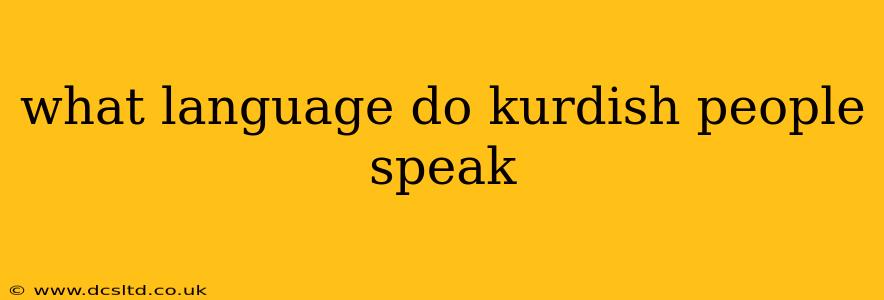What Language Do Kurdish People Speak?
The Kurdish people don't speak one single language, but rather a group of closely related Northwestern Iranian languages collectively known as Kurdish. This makes answering the question "What language do Kurdish people speak?" a bit more nuanced than a simple one-word answer. The most widely spoken dialects are often considered distinct languages in their own right, with significant variations in vocabulary, grammar, and pronunciation across different regions.
This linguistic diversity reflects the Kurds' historical dispersion across a vast geographical area spanning parts of Turkey, Iran, Iraq, Syria, and Armenia. Understanding this geographical spread is key to understanding the linguistic variety.
Here's a breakdown of the main Kurdish languages:
1. Kurmanji (Northern Kurdish): This is the most widely spoken Kurdish language, primarily used in Turkey, Syria, and parts of northern Iraq. It's also known as Kurdî, and is often written using the Latin alphabet. Within Kurmanji, there are further sub-dialects, leading to variations in spoken Kurmanji depending on location.
2. Sorani (Central Kurdish): Predominantly spoken in Iraq and parts of Iran, Sorani is the second most widely spoken Kurdish language. It's written using a modified Arabic script, which reads right-to-left. Again, slight variations exist even within the Sorani dialect depending on the specific region.
3. Pehlewani (Southern Kurdish): This dialect is spoken primarily in Iran and is less widely spoken than Kurmanji or Sorani. It has fewer speakers than the other two major dialects.
4. Other Dialects: Besides these three main dialects, there are several other less widely spoken Kurdish dialects, often considered sub-dialects of the major three, exhibiting regional variations.
What are the differences between Kurmanji and Sorani?
This is a frequently asked question, and the differences are quite significant, going beyond mere accent variations. While mutually unintelligible to a large degree, meaning speakers of one dialect cannot easily understand speakers of the other, there are some similarities in the roots of many words. The primary differences lie in:
- Writing system: Kurmanji predominantly uses the Latin alphabet, while Sorani utilizes a modified Arabic script. This directly impacts how the languages are written and read.
- Vocabulary: Many words differ significantly, though there are some cognates (words with a common ancestor).
- Grammar: While sharing some grammatical structures, there are also key differences in verb conjugation, noun declensions, and sentence structure.
Is there a standard Kurdish language?
There isn't a single, universally accepted standard Kurdish language. While attempts have been made to standardize certain aspects, the significant regional variations and political factors have hindered the creation of a unified standard. This linguistic diversity is a significant part of Kurdish cultural identity, and the lack of standardization is a complex issue with historical and political undertones.
How many Kurdish speakers are there in the world?
Estimating the exact number of Kurdish speakers globally is challenging due to the lack of standardized census data and the fluidity between dialects. However, estimates generally place the total number of Kurdish speakers in the tens of millions, making it a significant language family.
In conclusion, the question "What language do Kurdish people speak?" highlights the linguistic richness and complexity of Kurdish identity. Understanding that "Kurdish" encompasses a family of closely related languages, each with its own regional variations, is crucial for appreciating the cultural diversity of the Kurdish people.
